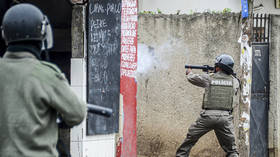Russian troops plunge into icy water near North Pole during Arctic drill (VIDEO)
Immersion in ice-cold water just a few miles from the North Pole wasn’t among the hardships planned for Russian airborne troops on a recent training mission, but the soldiers took the plunge anyway – just for fun, RT’s Roman Kosarev reports from the Arctic.
“There is nothing a Russian soldier cannot do,” Kosarev exclaimed, as men clad only in swimming trunks jumped through a hole cut in the 5-foot-thick (1.5 meter-) ice flow.
“And we’re right in the heart of the Arctic Ocean,” the impressed journalist added, noting that the water temperature was minus 2 degrees Celsius (28° F), while the air temperature stood at minus 26 Celsius (minus 15° F).
Arctic survivor: RT journalist joins elite task force drill near North Pole https://t.co/zQK6bMiLispic.twitter.com/9VPbv2V5hf
— RT (@RT_com) April 23, 2016
RT joined Russia’s airborne troops from the Collective Rapid Reaction Force (KSOR), who were holding a joint search and rescue training exercise with Belarusian troops at the Russian Barneo base, which was established on a drifting ice field near the North Pole to give elite units the opportunity to practice such drills in the severe conditions of Russia’s extreme North.
Before taking the icy bath, the officers gave first aid to mock artic travelers before evacuating them.
READ MORE: Surviving in the Arctic: RT journalist joins elite task force drill near North Pole
There is not much time for training left, Kosarev reported, explaining that as May approaches the ice begins to crack and drift, making it harder for planes to land at the base to transport people out.












